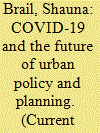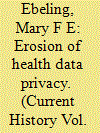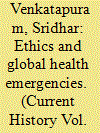| Srl | Item |
| 1 |
ID:
187176


|
|
|
|
|
| Summary/Abstract |
The pandemic has brought major disruptions to cities, particularly in patterns of work and transportation. Predictions of the death of downtowns may have been premature, but urban planners are rethinking the traditional central business district, transit systems, public spaces, and other key features of city life as many office workers remain slow to return to old routines. As they face the prospect of lower tax revenues, governments will have a major role to play in helping cities adapt and stay vibrant.
|
|
|
|
|
|
|
|
|
|
|
|
|
|
|
|
| 2 |
ID:
187179


|
|
|
|
|
| Summary/Abstract |
The COVID-19 pandemic has presented lessons on using health data to improve, save, and protect lives, and the need to improve the stewardship of health privacy. Before the pandemic, the United States already had a broken health data system, fragmented and dominated by public-private partnerships in which the businesses involved sought to commercialize patient data. More than two years into the pandemic, in many respects health data privacy is even more fractured and prone to being misused to profiteer and to harm rather than help the most vulnerable. Health data is now being used by law enforcement to criminalize abortion and undocumented immigration, making reform an urgent necessity.
|
|
|
|
|
|
|
|
|
|
|
|
|
|
|
|
| 3 |
ID:
187175


|
|
|
|
|
| Summary/Abstract |
The global response to the COVID-19 pandemic has been marred by a widespread failure to embed ethics in policymaking. The consequences have included vaccine hoarding by rich countries and the deaths of millions of people around the world. Governments have followed a simplistic narrative of science and finance teaming up against a virus and delivering a silver bullet in the form of a new vaccine, rather than recognizing that a health emergency reflects patterns of inequality within and across countries and other social factors that need to be addressed. Given the interconnection and interdependency of globalization, ethics must be incorporated in global health policy as a primary consideration, not an afterthought.
|
|
|
|
|
|
|
|
|
|
|
|
|
|
|
|
| 4 |
ID:
187177


|
|
|
|
|
| Summary/Abstract |
The pandemic has ushered in drastic new restrictions on the right to move, as governments have imposed lockdowns in more or less organized ways. In pursuit of its zero-COVID policy, China has gone farther than most in the extent and rigor of its mobility restrictions. Responsibility for enforcement has been redistributed to lower-level officials, landlords, and migrant labor agencies, while food delivery companies and others in the mobility business have thrived. These redistributions of mobility are likely to remain in place beyond the pandemic, changing relations between government and citizens.
|
|
|
|
|
|
|
|
|
|
|
|
|
|
|
|
| 5 |
ID:
187178


|
|
|
|
|
| Summary/Abstract |
The implementation of children’s rights is regarded as especially important in times of emergency. In responding to the COVID-19 pandemic, however, few governments around the world chose to pay explicit attention to children and their human rights. The adverse consequences of lockdowns for children’s education, health, and development have been profound. Had governments engaged with children and young people, as they have promised to do, some of these harms might have been reduced or avoided. In future emergencies, governments should ensure that children’s best interests are a primary consideration. Children and young people should also be involved in policymaking processes so that the impacts on them from public policies in any emergency are understood fully and addressed explicitly.
|
|
|
|
|
|
|
|
|
|
|
|
|
|
|
|
| 6 |
ID:
187180


|
|
|
|
|
| Summary/Abstract |
Looking at the pandemic in the long historical view of “slow disasters” shows how it is a continuation of previous health emergencies rather than a discrete event. The tendency of politicians to prematurely declare an end to the pandemic has not helped improve public trust in health policy.
|
|
|
|
|
|
|
|
|
|
|
|
|
|
|
|